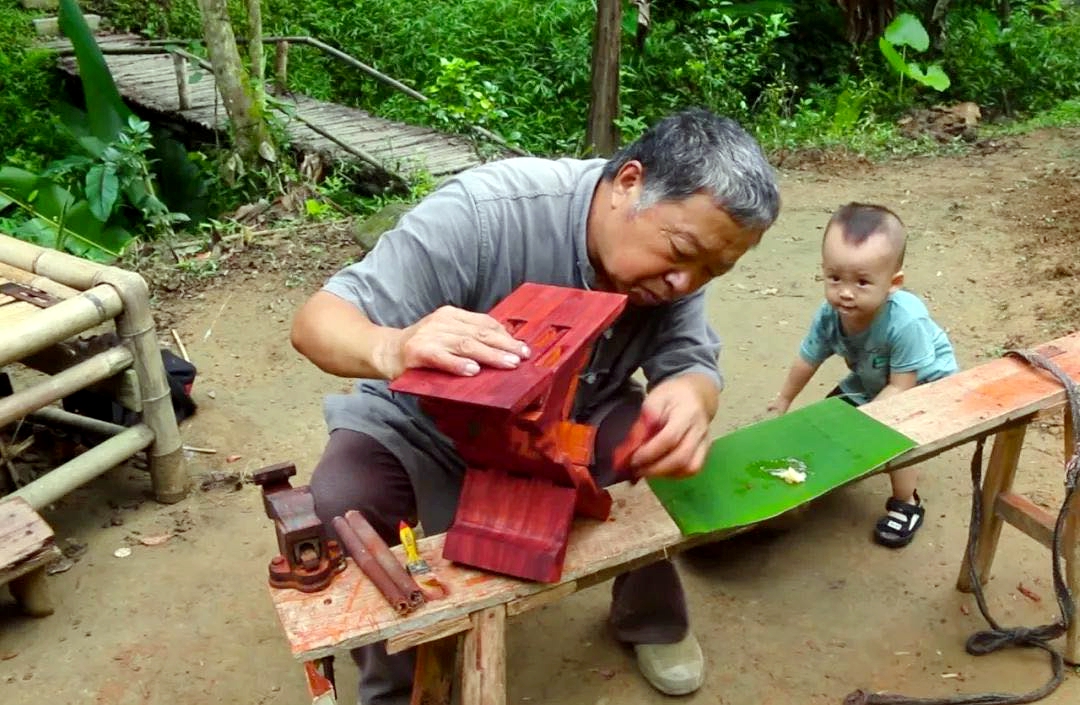Carpenter crafts his way to cyber stardom
By Shi Ruipeng and Ye Zizhen | China Daily | Updated: 2020-07-23 07:47

Consider Wang Dewen a fortunate man. While most people may be content to settle for one profession so long as it's a reasonably good fit, Wang has had three distinct incarnations over his lifetime. First, at a young age, he was a farmer; then he became a carpenter; and now, at age 63, he has become an internet celebrity.
Wang's YouTube account under the moniker Grandpa Amu, has 1.2 million followers. On video-sharing platform TikTok he has 2.6 million followers.
In Grandpa Amu's videos, he uses traditional Chinese mortise and tenon skills to make different wooden products, the same skill used in many classic structures in China, including the Forbidden City in Beijing.
The videos range from one minute to more than 20 minutes. Some were shot in front of his workshop, a wooden cabin, and others in the village where he lives with his grandson amid lush green trees and accompanied by the sound of a pleasant brook.
Watching Wang go about his work is a relaxing, even meditative experience brought by the Chinese folk atmosphere and soothing light background music, according to netizens.
Viewers may be surprised by Grandpa Amu's craftsmanship-no nails or glue are used, but the structures he builds are strong.
Wooden models he has made include a replica of the Chinese pavilion at the 2010 Shanghai World Expo, a Lu Ban chair, a Peppa Pig toy, a jumping kangaroo and an interlocking puzzle in the shape of an apple.
Followers' comments are appreciative, such as: "Astounding craftsmanship. And indeed no nails. What he can do with a couple of pieces of wood and an old saw is amazing."
Another of his followers on the internet said: "This is so beautiful to watch, but with modern tools and technologies, these traditional crafts may become obsolete. Please keep passing it on."
Wang, who was born in Liaocheng, Shandong province, had a hard upbringing. His father died in an accident when Wang was 9, and soon afterward the boy took on the responsibility of being the man of the house and helping his family make ends meet.
To do so, farming was insufficient, he felt. So he set out to learn another skill, becoming an apprentice carpenter with one of his relatives. In the decades to come he would become a master craftsman.
"I think that in this line of work being passionate makes it enjoyable," Wang said. "But you have to keep improving what you do, even if at times that may prove painful. From the very early days, I loved carpentry, but making things requires patience, concentration and thoughtfulness. What you're looking for in anything you make is beauty and balance."
Wang said it takes him between three and seven days to make something, with the steps including measuring, drawing lines on the wood, drilling, gouging and polishing.
In 2017, Wang moved from his home in Shandong to Wuzhou, in the Guangxi Zhuang autonomous region in southern China, to live with his son and take care of his grandson. Most of the things he makes in the video are toys that are eventually given to his grandson.
Ancient skills
The idea of shooting videos of his work soon sprouted.
"We want friends from overseas to have an idea about rural life in China," said Huang Chunmei, Wang's daughter-in-law. "We want to show them ancient Chinese skills."
Very few houses in China are made of wood these days, so this modern-day carpenter, who has skills that date back hundreds of years, is one of a rare breed.
Not long after Wang began posting videos on YouTube, some internet users began referring to him as a latter-day Lu Ban, a craftsman in Shandong who lived from 507 BC to 444 BC and is commonly referred to as the father of Chinese carpentry.
"I'm just an old farmer, and my carpentry skills can't match those of my forebears," Wang said. "I just want people to enjoy my videos as I show them some very interesting and sophisticated things."
Carpentry, farming and playing with his grandson are at the center of Wang's everyday life.
His son, Wang Baochen, who helps his father produce the videos, said: "We're eager to improve the quality and content of our videos, to highlight the uniqueness of this ancient Chinese skill. We're now considering holding offline activities so people can get a closer look at the process."
The popularity of the videos has made them the family's main source of income, Wang Baochen said.
























